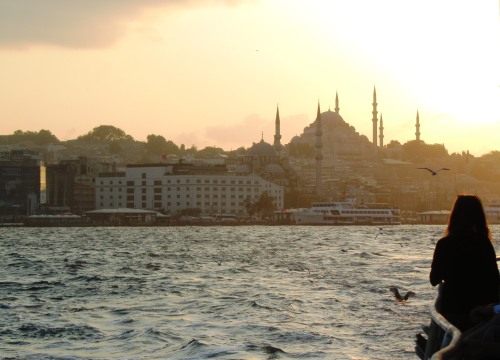
ANAMED is a place I associate with many different types of sounds. There are the nightly playlists of the clubs nearby—among these I only recognized Tarkan’s Dudu and Şımarık. Some of the other fellows are subjected to a completely different music playlist, and from this I understood that their rooms were nearer the Istiklal side. Others, like Selim, are on my side of Nur-i Ziya, and he tells me the songs we hear nightly are from the 80’s and 90’s in Turkey.
Then there are the different “Englishes” and different accents of the ANAMED fellows, especially when we are in groups. Once, during my first week here at ANAMED, about eight or nine of us piled into the elevator. Then somebody (maybe Susanna or Nebojša) noted that every single one of us was from a different country. As we descended in the glass shaft, the rest of us looked at each other’s faces and realized that that was true. There were smiles and “ahh, oh yes”es, and in an increasingly suspicious and border-obsessed world, that short elevator trip and the smiles exchanged gave me a warm feeling. I also get that nice feeling during our regular dinners, when I listen to the conversations. I would note all our different accents, our different responses to a story, our different hand movements, our different dietary preferences etc.
Then there is Bella Ciao.
I think I first noticed it when, on the weekends, I study alone in our common study room and I hear that same tune being repeated by the busker with his electronic toy piano on the street. The busker has other tunes too, but it is this tune that keeps playing in my head. I hummed it in an audio message on WhatsApp to my best friend, Tamara, and asked her if she knew what song it was. She is Lebanese and had worked as a film maker and editor in her previous life, and she told me that this was Bella Ciao. Wikipedia says it is a song of resistance.
Sometimes we hear its tune too on weekdays, when there are more of us in the study room. Bella ciao, bella ciao, bella ciao ciao ciao…
One day, I went out for lunch at Fıccın and I saw the kid on the street who was playing it. He stands there alone, but so far I have always walked by him without giving money. Sometimes it is a different kid, probably also a refugee, but it looks like they use the same electronic toy piano which they diligently blow into. And they play that same tune, which has acquired a haunting quality for me.
Haunting because it reminds me of the uncomfortable things, the things we have to (or at least, I do) forget, suppress, and ignore, in order to live our daily middle-class lives and finish writing our dissertations. The things about the world today we have to—or at least, I have to—accept that I cannot change.
Another sound I associate with ANAMED is the sound of either Hugh or Robert turning on a tap or the shower. Once, over dinner, I told Robert about my irrational belief that the ANAMED building had a daily quota of warm water, and that we had to compete with each other to get our fair share. And so whenever I heard either of them turn on a tap, I felt impelled to leap out of bed and into the shower and to start my day—just so I can have a warm shower at somebody else’s expense. It’s a dog-eat-dog world, it’s either I get a warm shower or Robert/Hugh steals mine!—according to my theory. I was told that my belief is indeed unfounded and untrue, but nobody has, as yet, solved the mystery of when and how one can reliably obtain warm water in our showers.
These are my happy problems. In a previous life, I once lived in an all-girls dormitory in Delhi and during the winters, it had no central heating but, in fact, plenty of open gaps in the walls that functioned as windows. We bathed out of buckets which we filled manually with boiling water (there was one special tap in the bathroom that gave boiling water) and mixed it with normal tap water, and scooped them up with little plastic jugs onto our shivering bare skins, all the while looking at that open gap in the wall and wondering why nobody thought to install a window pane, as if that would have protected us from the cold.
So sometimes, when I hear the water go on in either Robert’s or Hugh’s room, but I want to stay in bed awhile longer, I remember my tough younger days in the Delhi dorms, and I think to myself—it’s okay, I will let them use the warm water—and I go back to sleep.
And sometimes I oversleep by a lot, and I wake up to the noisy buskers of Istiklal Avenue, who begin their performances after all the trucks and vans clear out. I wake up to the soundscape that surrounds our ANAMED home, and to that one melody that pierces through it all and reminds me that I am complicit and guilty.
But I have the privilege of ignoring it, and so I do.
Bella ciao, bella ciao, bella ciao ciao ciao…

